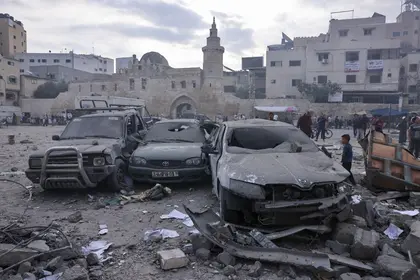One fingerprint points to Russia’s involvement in the attack on Israel by Hamas terrorists out of Gaza. The assault took place on Oct. 7, Vladimir Putin’s birthday, and is an event that benefits Moscow greatly. Oil prices have jumped, the Middle East is destabilized, a comprehensive Saudi-Israeli agreement was halted, and Israel’s struggle is already distracting attention, and possibly funds, away from Russia’s destruction of Ukraine.
While a coincidental birth date does not constitute concrete evidence, there are other telltale signs that Russia is heavily involved with Iran who many believe helped plan the attack. The two countries, the most sanctioned in the world, have become closely aligned militarily. Putin’s first foreign visit following the Feb. 24 2022 full-scale invasion of Ukraine was to Iran in July of that year, since when they have formed a lucrative and sizeable defense partnership, providing one another with drones, missiles, and expertise.
JOIN US ON TELEGRAM
Follow our coverage of the war on the @Kyivpost_official.
Russia’s initial response to the shocking invasion of Israel by terrorists on October 7 has also been unusually tepid and neutral. Its spokesman said only that Russia was “extremely concerned” and that the fighting must stop. There are also reports that, if true, maintain that Putin has not sent condolences to Israel in the days after the attack nor has he called his “friend” Israeli Prime Minister Benjamin Netanyahu, with whom he claims to have developed a close relationship.

Accidents, Not Russians, to Blame for Undersea Cable Damages, Western Intelligence Says
This is uncharacteristic because Putin has kept in very close contact with Israel leaders since the Ukrainian invasion in 2022, mostly to prevent it from wading in on Ukraine’s side by providing the Iron Dome air defense system and other assistance to Ukraine.
On October 8, the Washington DC based Institute for the Study of War noted Israel’s plight is being weaponized as part of the Kremlin’s “info war”.
It wrote: “the Kremlin is already and will likely continue to exploit the Hamas attacks in Israel to advance several information operations intended to reduce US and Western support and attention to Ukraine. These Kremlin narratives target Western audiences to drive a wedge in military support for Ukraine, seek to demoralize Ukrainian society by claiming Ukraine will lose international support, and intend to reassure Russian domestic audiences that the international society will ignore Ukraine’s war effort.”
Naturally, Russian mouthpieces, on its state television and military blogs, have been pushing the Kremlin narrative that the attack reveals Western weakness (given the huge US military support to Israel) and will divert military help from Ukraine to Israel.
Fighting has spread to Israel’s northern border with Lebanon where Iran’s proxy terrorist organization, Hezbollah, is ensconced and has missiles trained on Israeli cities. Iran has praised the Hamas incursion but not admitted involvement, nor will Russia, but the two are major oil producers and military allies. Tehran has been a major supplier of drones and missiles to Russia since the start of its 2022 war against Ukraine.
In Syria, where both Iran and Russia were engaged in helping prop up dictator Bashar al-Assad’s regime, they developed a “full-fledged defense partnership” which included Putin’s Wagner Group. On behalf of Damascus, they destroyed cities and targeted civilians in ways similar to the current demolition underway in Ukraine. It is a match made in heaven (or hell): Russia’s alliance has bolstered Iran’s importance and reach in the Middle East, and Iran’s arms have kept Russia equipped and in the war game.
It's also important to note that one report disclosed that a portion of the Wagner Group remains in Syria and others have been transferred over to Iranian and Hezbollah forces. “They continue to put pressure on American troops still in Syria,” it said. Obviously, Wagner could have been recruited to train and plan the October 7 Hamas massacre. It’s right up their alley.
Clearly, the Russia-Iran relationship is a threat to Europe as well as the United States and the Middle East, according to a warning published by the European Council on Foreign Affairs. “The war in Ukraine has led to unprecedented levels of Russian-Iranian cooperation in the military, economic, and political spheres. The new relationship between Russia and Iran is a direct threat to the EU and European countries. Russian-Iranian cooperation could prolong the war in Ukraine, increase Iranian capacity to advance its nuclear programme, de-stabilise the Middle East, and undermine Western influence in institutions of global governance.”
In May, US officials warned the two were increasing their firepower and danger to the world. “Russia has been offering Iran unprecedented defense cooperation,” including on electronics and air defense, White House spokesman Michael Kirby said. “Last month, Iran announced that it had finalized a deal to buy SU-35 fighter jets from Russia. Iran is seeking to purchase additional military equipment from Russia, including attack helicopters, radars and Yak-130 combat trainer aircraft. In total, Iran is seeking billions of dollars’ worth of military equipment from Russia. This is a full-scale defense partnership, one that is harmful to Ukraine, to the region in the Middle East, and to the international community.”
This is a dangerous development, but hardly surprising given Russia’s predations. In a speech on Oct. 9 to NATO, Ukrainian president Volodymyr Zelensky blamed Russia and Hamas, the Palestinian faction that controls Gaza and is supported by Iran, as “the same evil”. He added “the only difference is that there is a terrorist organization that attacked Israel, and here is a terrorist state that attacked Ukraine.”
The views expressed in this opinion article are the author’s and not necessarily those of Kyiv Post.
You can also highlight the text and press Ctrl + Enter










